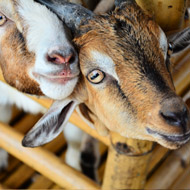Deadly goat plague threatens Europe

PPR infects small ruminants such as sheep and goats and can have a mortality rate as high as 90 per cent.
A devastating and neglected livestock disease that is prevalent throughout Africa now poses a threat to sheep and goat populations in Europe, according to scientists from the Pirbright Institute.
Writing in the journal PLOS one, researchers conclude that the lack of a coordinated vaccine for peste des petits ruminants (PPR) - together with porous national borders in North Africa - has enabled the virus to spread.
Also known as goat plague, PPR is a contagious disease caused by the PPR virus (PPRV). It infects small ruminants such as sheep and goats and can have a mortality rate as high as 90 per cent. Pigs and cattle can contract the infection too, but tend not to develop clinical signs.
First discovered in 1942 in Western Africa’s Ivory Coast region, PPRV now prevails throughout Asia, Africa and the Middle East. The FAO (Food and Agriculture Organisation of the United Nations) and the OIE (World Organisation for Animal Health) aims to eradicate the disease by 2030.
To improve their understanding of how the virus spreads, researchers isolated and characterised the PPR virus from outbreaks on two farms in northern Algeria and sequenced its full-length genome. The team then compared this to the circulating strain of PPRV within northern and eastern Africa, as well as globally.
They found that one lineage of the virus spread along known animal movement routes from east Africa into northern Africa. The presence of the same virus in later outbreaks in Morocco, Algeria and Tunisia indicates a continual regional circulation.
Commenting on the findings, study leader professor Satya Parida said: “PPR is a neglected disease and inconsistent vaccination strategies, coupled with porous national borders in North Africa region where there is the significant illegal animal trade, has enabled the virus to persist and spread. Safe and effective vaccines are available for PPRV and there is an urgent need for a more coherent approach to vaccination both regionally and globally.
“The continuous circulation of PPRV in the Maghreb region of North Africa and its recent move towards the northern part of Algeria and Morocco approaching Gibraltar and the extensive trade links with Europe (Spain, France and Italy), has increased the risk of an incursion into Europe and is a significant concern.”
Dr Parida adds that the strict regulation of live animal imports into Europe means the risk of incursion in this way is unlikely. However, the transport of animals from Europe to the Maghreb region means there is a chance the virus could spread via returning trucks used for transporting animals.
“Therefore the effective cleaning and disinfection of vehicles used to transport livestock is essential before they return to Europe, as well as strong customs and quarantine control at sites of entry to Europe from North Africa,” she concludes.



 The BSAVA has opened submissions for the BSAVA Clinical Research Abstracts 2026.
The BSAVA has opened submissions for the BSAVA Clinical Research Abstracts 2026.